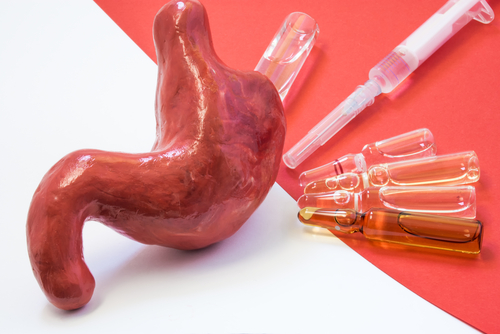The U.S. Food and Drug Administration (FDA) has granted accelerated approval to Merck’s Keytruda (pembrolizumab) for the treatment of patients with advanced or metastatic gastric or gastroesophageal junction (GEJ) adenocarcinoma.
The approval makes Keytruda available for patients with PD-L1-positive tumors as determined by an FDA-approved test and who progressed following two or more lines of treatment, including fluoropyrimidine and platinum-based chemotherapy. If appropriate, patients must also have received HER2-targeted therapy.
The accelerated approval was supported by positive tumor response rates and durability of responses seen in the Phase 2 KEYNOTE-059 trial (NCT02335411). Continued approval is dependent on confirmatory trials that further demonstrate Keytruda’s benefit for these gastric cancer patients.
“Historically, advanced gastric cancer has been particularly challenging to treat, and new treatment options are needed for these patients,” Charles S. Fuchs, MD, MPH, lead investigator and director of Yale Cancer Center, said in a press release. “The results observed in the diverse population of heavily pretreated advanced gastric or GEJ patients from the KEYNOTE-059 clinical trial demonstrate that pembrolizumab in the third-line setting has the potential to shift how we care for certain patients facing this difficult-to-treat disease.”
KEYNOTE-059, a global, multicenter, non-randomized, open-label multi-cohort trial, included 259 patients with gastric or GEJ adenocarcinoma who progressed on or after at least two prior treatment regimens for advanced disease.
Previous treatment included a fluoropyrimidine and platinum combo chemotherapy. For patients with HER2-positive tumors, prior treatments had to include HER2-targeted therapy. Participants received 200 mg Keytruda every three weeks, for up to two years.
Results presented recently at the ESMO 2017 Congress showed that patients whose tumors expressed PD-L1 had better response rates than those that did not. Among the 143 patients with PD-L1-positive tumors, 13.3% responded to Keytruda, including 1.4% whose tumor completely disappeared.
The responses were sustained for six months or longer in 58% of these patients, and 26% had responses lasting for at least one year.
The treatment-related adverse reactions were in accordance with previous data from melanoma and non-small cell lung cancer patients. The most common adverse effects were fatigue, musculoskeletal pain, decreased appetite, itch, diarrhea, nausea, rash, fever, cough, difficulty breathing, and constipation.
“Keytruda is now the first PD-1 checkpoint inhibitor approved in the United States for previously treated advanced gastric or GEJ cancer, helping to address a recognized treatment gap,” said Roger M. Perlmutter, president of Merck Research Laboratories. “This approval marks another milestone – the tenth new indication for Keytruda in just three years – which further demonstrates both our commitment to patients and the progress we have made in the fight against many cancers.”
Merck says it is committed to helping patients access its anti-cancer therapies. The Merck Access Program aims to improve patient access and promote treatment by offering reimbursement support and co-pay assistance for eligible patients.
The company also provides free access to Keytruda for eligible patients who cannot afford it and have no other means to gain access. Additional information about the patient support program can be found at the program’s website or by calling 855-257-3932.


